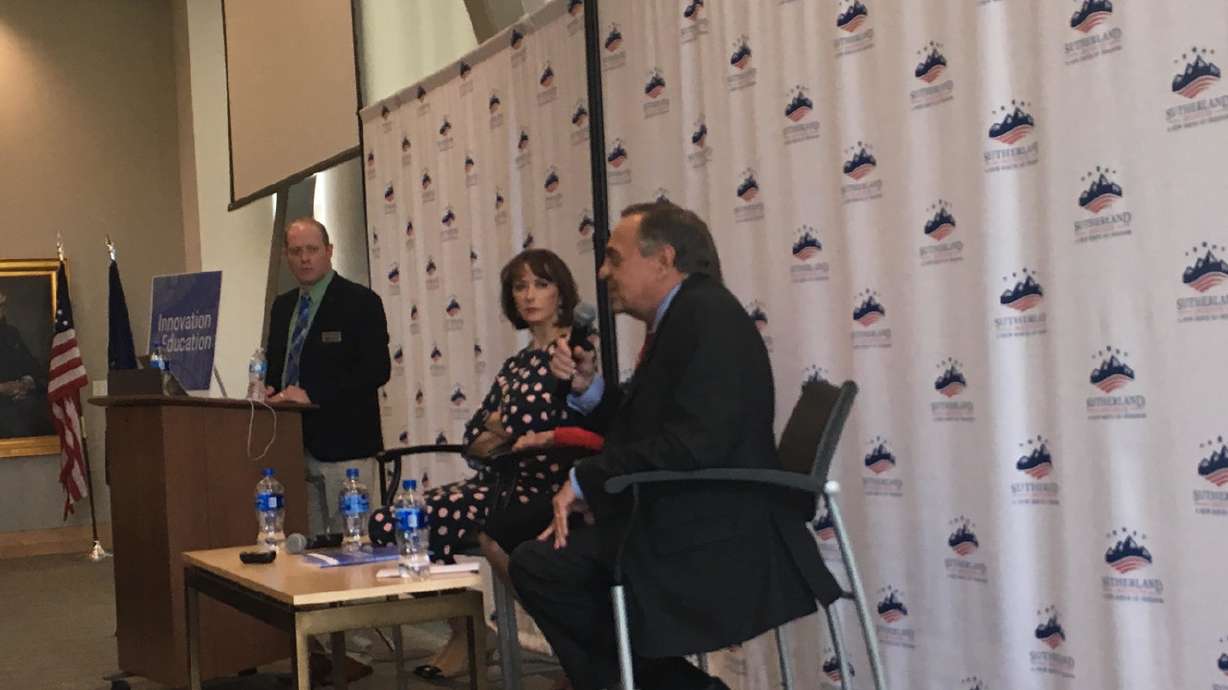Estimated read time: 4-5 minutes
This archived news story is available only for your personal, non-commercial use. Information in the story may be outdated or superseded by additional information. Reading or replaying the story in its archived form does not constitute a republication of the story.
SALT LAKE CITY — Utah has made progress in recent years when it comes to personalizing education and broadening opportunities for underserved students — but there’s still work to be done.
That was the central message at an education symposium Wednesday, where state officials, policy analysts, and educational leaders gathered to discuss reforms in Utah and elsewhere.
Speakers at the Sutherland Institute’s “Innovation in Education” symposium included BYU-Pathway Worldwide President Clark Gilbert, State Superintendent of Public Instruction Sydnee Dickson, Utah state Sen. Ann Millner, and David Buhler, commissioner of higher education for Utah.
Dickson and Millner, R-Ogden, called for more flexibility and personalization in Utah schools, while Gilbert highlighted some of the nontraditional approaches used by the BYU-Pathway system and other Utah-based colleges. A key component of making educational success more accessible, the speakers emphasized, is meeting students where they are, both literally and figuratively.
"Utah has some great innovation happening" in higher education, Gilbert said in his keynote remarks, citing the competency-based model of Western Governors University, an online school, as one example. "It’s amazing the flourishing that’s happening in the industry. But it tends to happen from people who are not afraid of doing something different than the system."
Enrollment in the online BYU-Pathway Worldwide program has surpassed enrollment at Brigham Young University's main campus as of 2019, with nearly 50,000 students around the world participating this year. The program, which offers a tuition that’s roughly half the typical community college tuition, doesn't require entrants to have a GED or high school diploma. After completing a one-year program that teaches basic literacy and math skills by applying the concepts to practical life situations, students can go on to earn a certificate or degree online.
"We said we need to look at students who never come to campus, who never thought they could access a university, and create different opportunities for them," Gilbert said.
Yes, we have a completion problem. Frankly, it’s a crisis.
–Clark Gilbert, BYU-Pathway Worldwide president
BYU-Pathway Worldwide has the third-highest graduation rate of higher education institutions in the state, with just over 50 percent of students finishing within six years. But Pathway and other Utah colleges still have a long way to go when it comes to graduation rates, Gilbert told attendees.
"Yes, we have a completion problem," he said. "Frankly, it’s a crisis."
To ensure that students stay enrolled in college, Buhler said, universities have begun to use technology with predictive analytics to identify — and then assist — those who may be struggling.
"There are certain things you can watch for right along the way, so if a student is having trouble you can intervene and not say, 'Oh, you’re in trouble' … but be able to work with them in a more intentional way," Buhler said.
Enjoy photos from our Innovation in Education Symposium! #SutherlandEvents#utpol#utleg#utedhttps://t.co/IXBcI1IZu2
— Sutherland Institute (@SutherlandInst) May 15, 2019
Other strategies, such as stackable credentials that let students divide their post-secondary education into shorter segments, are aimed at helping students who are unable to earn their degree all at once. The Utah Board of Regents requested in its 10 year strategic plan, approved in 2016, that colleges create ways for students to complete certificates and associate degrees along the path to earning a bachelor's degree.
There's also been a push statewide at the K-12 level to make schooling more tailored to individual students' needs, including a broader shift to competency-based education with an eye towards introducing different ways of assessing students' capabilities, Dickson and Millner noted. Competency-based education is centered around how well students have mastered a certain skill or concept, rather than moving students through the system based on the amount of time they've spent on a class or subject.
.@ClarkGilbert at Innovation in Education: "The PathwayConnect curriculum is designed to build hope and confidence in students by teaching life skills, professional skills, and college skills." #SutherlandEvents#utpol#utedpic.twitter.com/hVVNuE38PY
— Sutherland Institute (@SutherlandInst) May 15, 2019
"We’re trying to develop a more nimble system and one that’s very targeted on personalized education," Dickson said.
This could mean giving schools greater flexibility with scheduling and classroom environments. In response to an audience question about rural schools that have proposed offering classes only four days a week, Millner said she would like to see the state move away from its requirement that schools provide 990 instructional hours over a minimum of 180 school days.
"Having systems that allow us to be more flexible about where (students) learn, how they learn, and the pace that they learn, and having policies around that, is going to be important," Millner said. Email: gkauffman@deseretnews.com Twitter: @gretelkauffman








